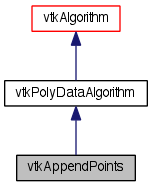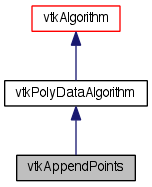appends points of one or more vtkPolyData data sets More...
#include <vtkAppendPoints.h>


Public Types | |
| typedef vtkPolyDataAlgorithm | Superclass |
Public Member Functions | |
| virtual int | IsA (const char *type) |
| vtkAppendPoints * | NewInstance () const |
| void | PrintSelf (ostream &os, vtkIndent indent) |
| virtual void | SetInputIdArrayName (const char *) |
| virtual char * | GetInputIdArrayName () |
| virtual void | SetOutputPointsPrecision (int) |
| virtual int | GetOutputPointsPrecision () |
Static Public Member Functions | |
| static vtkAppendPoints * | New () |
| static int | IsTypeOf (const char *type) |
| static vtkAppendPoints * | SafeDownCast (vtkObjectBase *o) |
Protected Member Functions | |
| virtual vtkObjectBase * | NewInstanceInternal () const |
| vtkAppendPoints () | |
| ~vtkAppendPoints () | |
| virtual int | RequestData (vtkInformation *, vtkInformationVector **, vtkInformationVector *) |
| virtual int | FillInputPortInformation (int, vtkInformation *) |
Protected Attributes | |
| char * | InputIdArrayName |
| int | OutputPointsPrecision |
Detailed Description
appends points of one or more vtkPolyData data sets
vtkAppendPoints is a filter that appends the points and associated data of one or more polygonal (vtkPolyData) datasets. This filter can optionally add a new array marking the input index that the point came from.
- See also:
- vtkAppendFilter vtkAppendPolyData
- Tests:
- vtkAppendPoints (Tests)
Definition at line 36 of file vtkAppendPoints.h.
Member Typedef Documentation
Reimplemented from vtkPolyDataAlgorithm.
Definition at line 40 of file vtkAppendPoints.h.
Constructor & Destructor Documentation
| vtkAppendPoints::vtkAppendPoints | ( | ) | [protected] |
| vtkAppendPoints::~vtkAppendPoints | ( | ) | [protected] |
Member Function Documentation
| static vtkAppendPoints* vtkAppendPoints::New | ( | ) | [static] |
Create an object with Debug turned off, modified time initialized to zero, and reference counting on.
Reimplemented from vtkPolyDataAlgorithm.
| static int vtkAppendPoints::IsTypeOf | ( | const char * | name | ) | [static] |
Return 1 if this class type is the same type of (or a subclass of) the named class. Returns 0 otherwise. This method works in combination with vtkTypeMacro found in vtkSetGet.h.
Reimplemented from vtkPolyDataAlgorithm.
| virtual int vtkAppendPoints::IsA | ( | const char * | name | ) | [virtual] |
Return 1 if this class is the same type of (or a subclass of) the named class. Returns 0 otherwise. This method works in combination with vtkTypeMacro found in vtkSetGet.h.
Reimplemented from vtkPolyDataAlgorithm.
| static vtkAppendPoints* vtkAppendPoints::SafeDownCast | ( | vtkObjectBase * | o | ) | [static] |
Reimplemented from vtkPolyDataAlgorithm.
| virtual vtkObjectBase* vtkAppendPoints::NewInstanceInternal | ( | ) | const [protected, virtual] |
Reimplemented from vtkPolyDataAlgorithm.
| vtkAppendPoints* vtkAppendPoints::NewInstance | ( | ) | const |
Reimplemented from vtkPolyDataAlgorithm.
| void vtkAppendPoints::PrintSelf | ( | ostream & | os, |
| vtkIndent | indent | ||
| ) | [virtual] |
Methods invoked by print to print information about the object including superclasses. Typically not called by the user (use Print() instead) but used in the hierarchical print process to combine the output of several classes.
Reimplemented from vtkPolyDataAlgorithm.
| virtual void vtkAppendPoints::SetInputIdArrayName | ( | const char * | ) | [virtual] |
Sets the output array name to fill with the input connection index for each point. This provides a way to trace a point back to a particular input. If this is NULL (the default), the array is not generated.
| virtual char* vtkAppendPoints::GetInputIdArrayName | ( | ) | [virtual] |
Sets the output array name to fill with the input connection index for each point. This provides a way to trace a point back to a particular input. If this is NULL (the default), the array is not generated.
| virtual void vtkAppendPoints::SetOutputPointsPrecision | ( | int | ) | [virtual] |
Set/get the desired precision for the output type. See the documentation for the vtkAlgorithm::DesiredOutputPrecision enum for an explanation of the available precision settings. If the desired precision is DEFAULT_PRECISION and any of the inputs are double precision, then the output precision will be double precision. Otherwise, if the desired precision is DEFAULT_PRECISION and all the inputs are single precision, then the output will be single precision.
| virtual int vtkAppendPoints::GetOutputPointsPrecision | ( | ) | [virtual] |
Set/get the desired precision for the output type. See the documentation for the vtkAlgorithm::DesiredOutputPrecision enum for an explanation of the available precision settings. If the desired precision is DEFAULT_PRECISION and any of the inputs are double precision, then the output precision will be double precision. Otherwise, if the desired precision is DEFAULT_PRECISION and all the inputs are single precision, then the output will be single precision.
| virtual int vtkAppendPoints::RequestData | ( | vtkInformation * | request, |
| vtkInformationVector ** | inputVector, | ||
| vtkInformationVector * | outputVector | ||
| ) | [protected, virtual] |
This is called by the superclass. This is the method you should override.
Reimplemented from vtkPolyDataAlgorithm.
| virtual int vtkAppendPoints::FillInputPortInformation | ( | int | port, |
| vtkInformation * | info | ||
| ) | [protected, virtual] |
Fill the input port information objects for this algorithm. This is invoked by the first call to GetInputPortInformation for each port so subclasses can specify what they can handle.
Reimplemented from vtkPolyDataAlgorithm.
Member Data Documentation
char* vtkAppendPoints::InputIdArrayName [protected] |
Definition at line 74 of file vtkAppendPoints.h.
int vtkAppendPoints::OutputPointsPrecision [protected] |
Definition at line 75 of file vtkAppendPoints.h.
The documentation for this class was generated from the following file:
- dox/Filters/General/vtkAppendPoints.h
 1.8.0
1.8.0